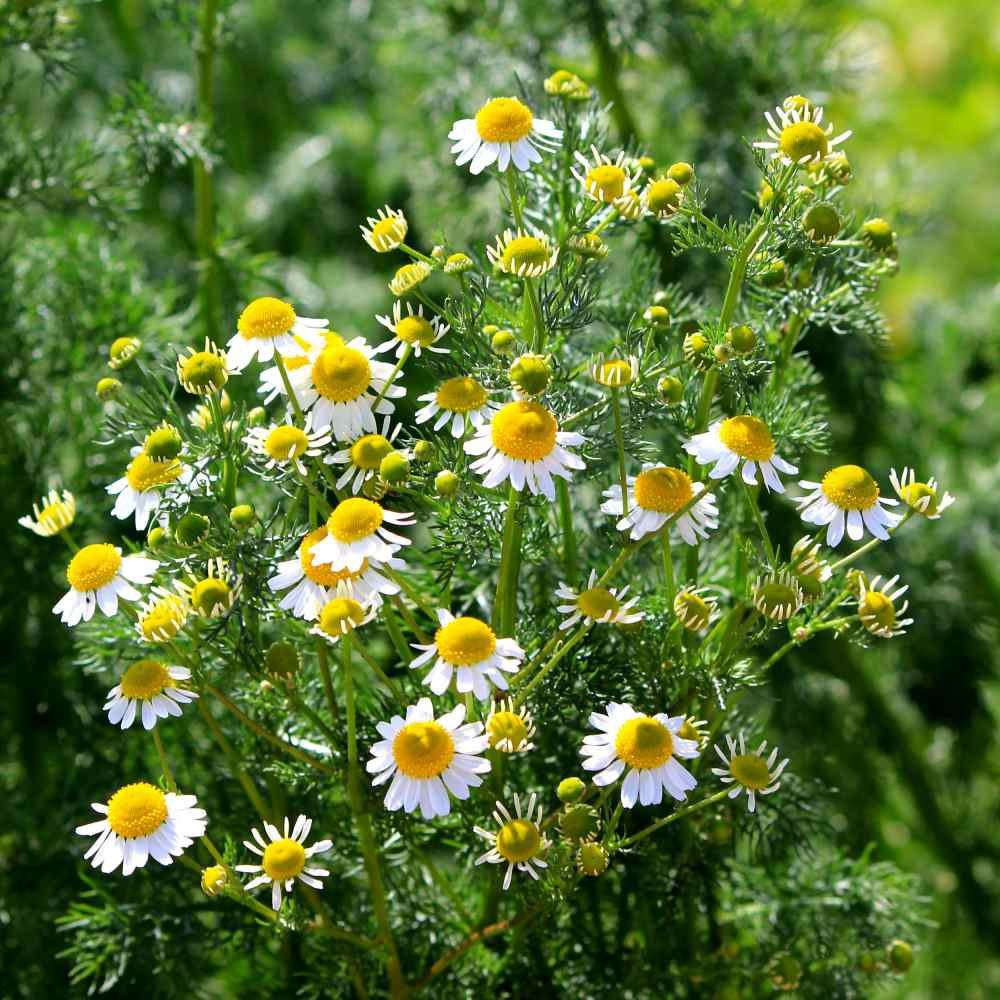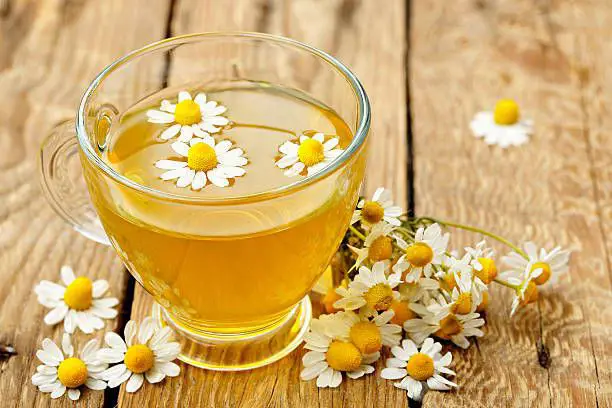A calming and gentle chamomile tea is ideal for evening relaxation, providing a soothing respite after a hectic day. However, it may come as a surprise that chamomile tea shares some unexpected similarities with Zest Energy Tea, the high-caffeine morning beverage favored by go-getters.
This caffeine tea guide will walk you through Chamomile’s beautiful qualities and advantages, shedding light on its caffeine content. Chamomile, a significant component of our herbal sleep tea, possesses remarkable potency, albeit in a manner that might defy your initial expectations.
What Is Chamomile Tea?
Chamomile tea is categorized as an herbal infusion. Unlike the conventional tea varieties such as green, black, and oolong tea, it does not originate from the Camellia sinensis tea plant.
Chamomile tea is an herbal tea derived from the dried flower head of chamomile plant, specifically from two primary species: German Chamomile (Matricaria chamomilla or Matricaria recutita) and Roman Chamomile (Chamaemelum nobile). Both species have a long history of use in traditional medicine and have distinct but complementary qualities.
What are German and Roman Chamomile?
German Chamomile (Matricaria recutita), known for its vibrant yellow flowers, is the more commonly used variety for making chamomile tea, and Roman Chamomile (Chamaemelum nobile) with its white and yellow daisy-like flowers are distinct Chamomile species. Yet, they share similar roles in herbal medicine. These two varieties differ primarily in the following ways:


●German Chamomile boasts a robust, more pronounced aroma and flavor, while Roman Chamomile offers a gentler, sweeter profile
●German Chamomile is renowned for its efficacy in addressing inflammatory skin conditions, whereas Roman Chamomile excels in addressing digestive issues.
A Brief Historical Perspective
The use of this fantastic flowering plant dates back thousands of years to ancient civilizations. It was cherished by the Egyptians, Greeks, and Romans for its medicinal properties. The name “chamomile” is derived from the Greek words “khamai” and “melon,” which mean “ground” and “apple,” respectively, describing the apple-like scent of the plant.
Understanding Caffeine in Tea
Before delving into the caffeine content of chamomile tea, it’s essential to understand how caffeine is typically found in tea. Traditional black, green, white, and oolong teas are produced from the Camellia sinensis plant, which has varying amounts of caffeine in its leaves. The level of caffeine in these teas depends on several factors, including the tea variety, processing method, and brewing time.
Black tea, for example, typically contains the highest amount of caffeine among the traditional teas, followed by oolong tea. Green tea has a moderate caffeine content, while white tea generally contains the least caffeine. However, even within these categories, caffeine levels can vary significantly.
Caffeine in Herbal Teas
Unlike traditional teas made from the Camellia sinensis plant, herbal teas are naturally caffeine-free. Herbal teas are created by infusing various herbs, flowers, fruits, and spices in hot water. Since they do not contain tea leaves, they do not naturally contain caffeine.
Chamomile Tea: A Caffeine-Free Herbal Delight
Chamomile tea is among the greatest examples of herbal infusions without caffeine. This delicious tea is made from the flowers of the chamomile plant, Matricaria chamomilla or Matricaria recutita. It is renowned for its soothing, delicate characteristics. People who desire to avoid caffeine for different reasons frequently use chamomile since it is naturally caffeine-free.
The Health Benefits of Chamomile Tea
This soothing herbal infusion tea is celebrated not only for its delightful taste but also for its potential therapeutic properties. Let’s explore some of the compelling health benefits associated with this soothing tea:
Relaxation and Stress Reduction
The extraordinary power of chamomile tea to encourage relaxation and lessen tension is one of the main reasons people resort to it. Chamomile is a great option for unwinding after a long day or as a natural cure for anxiety and sleep issues because of its moderate sedative characteristics that may help relax the mind.
Anti-inflammatory Benefits
Numerous studies have established the favorable anti-inflammatory properties of caffeine-free chamomile tea. The ability to reduce inflammation holds significant potential for addressing a wide range of ailments and diseases, including inhibiting inflammatory mediator release in cases of inflammatory bowel diseases and effectively alleviating PMS symptoms in women.
Improve Sleep Quality
A study on elderly individuals found that Chamomile extract can notably enhance sleep quality. This quality makes Chamomile a favored ingredient in herbal sleep solutions, often combined with valerian root and peppermint. Our herbal sleep remedy blends Chamomile with lavender, l-theanine, and melatonin to promote restful sleep.
Control Blood Sugar Level
The potential of Chamomile to substantially reduce blood sugar levels is promising, especially for individuals with diabetes. Regular intake of chamomile tea demonstrates a notable glucose-lowering impact, to the extent that one study suggests it could serve as an alternative to conventional drug treatments for hyperglycemia. Nevertheless, it’s crucial to consult with a healthcare provider or medical professional before implementing any modifications to your regimen.
Reduce Heart Disease Risk
Chamomile tea boasts anti-inflammatory and antimicrobial qualities, making it a fantastic beverage choice for heart disease patients. It may also aid in maintaining optimal blood pressure. Moreover, the connection between caffeine and heart disease is uncertain, making Chamomile an excellent caffeine-free option.
Studies have even revealed Chamomile’s potential to inhibit platelet formation in laboratory settings, hinting at its potential benefits in preventing clots in stroke patients and reducing plaque buildup in atherosclerosis.
Great For your Skin
Applying German chamomile oil, extracted from the Matricaria recutita plant, can effectively alleviate irritation and deter scratching when applied directly to the skin. This implies that Chamomile is a valuable resource for promoting skin well-being, especially for individuals with acne-prone skin or the urge to scratch red blemishes. Additionally, Chamomile’s antioxidants and anti-inflammatory properties may contribute to reducing redness.
Boost Your Immune System
Although this health claim has limited scientific backing, some believe a cup of chamomile tea can enhance the immune system to combat a cold. While there is no substantial evidence to substantiate this belief, it is established that Chamomile possesses anti-inflammatory properties that can potentially alleviate a sore throat. Additionally, consuming hot herbal teas can decongest the nasal passages, akin to the steam from a hot shower, suggesting that chamomile tea is beneficial when dealing with a cold.
How to Prepare Chamomile Tea
Making Chamomile tea is a straightforward process. Here’s a simple guide to brewing the perfect cup.
Ingredients:
●Dried Chamomile flowers (1-2 teaspoons per cup)
●Freshly boiled water
Instructions
●Boil water and cool slightly for a minute or two to around 200°F (93°C).
●Place the dried Chamomile flowers in a teapot or tea infuser.
●Pour the boiled water over the chamomile flowers.
●Cover the teapot or tea infuser and let the Chamomile steeps for 6-9 minutes, depending on your preference. Longer steeping times will result in a more robust flavor.
●Pour some tea into a cup, then sip it. If you want more taste, you may also add honey or a piece of lemon.
Precautions and Considerations
While the tea is generally safe for most individuals, there are some precautions to keep in mind:
Pregnancy
Pregnant women should seek a healthcare provider before consuming chamomile tea in large quantities, as it may amplify uterine contractions.
Allergies
Some people may be allergic to Chamomile. If you have allergies to plants in the Asteraceae family (such as ragweed, marigolds, or daisies), consult a healthcare professional before consuming Chamomile.
Conclusion
Because chamomile tea is actually caffeine-free, it is the ideal beverage for anybody looking for something calming and soothing without the energizing benefits of caffeine. Its long history as an herbal remedy and its numerous health benefits solidify its place as a beloved beverage worldwide. Whether you enjoy it for its taste or its therapeutic properties, you can savor chamomile tea without worrying about caffeine-induced jitters. So, brew chamomile tea to unwind and experience its natural, caffeine-free goodness.
